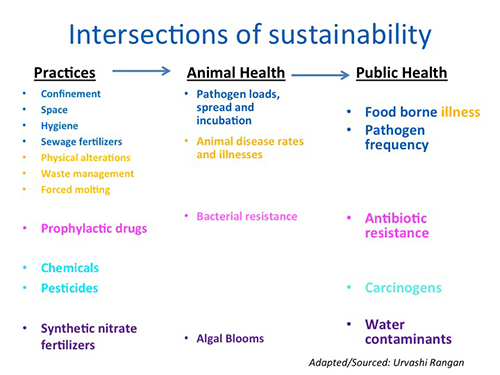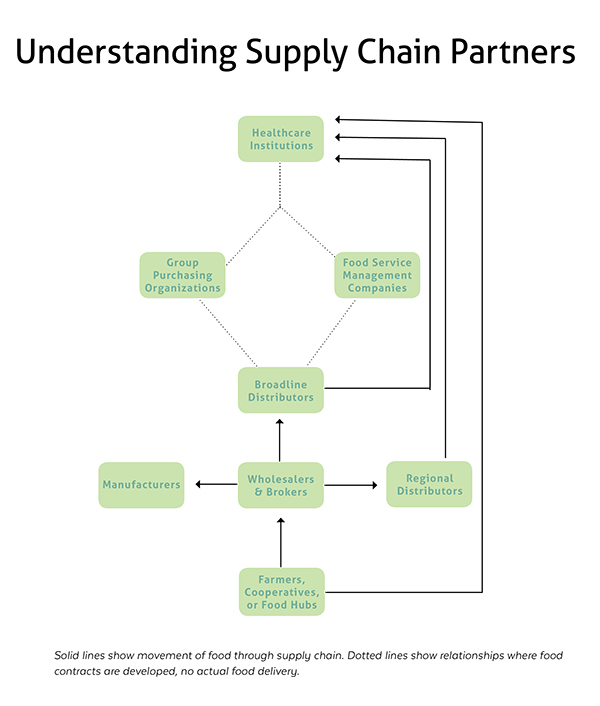Hospitals collaborate with vendors to address public health through animal agriculture

By Hillary Greenwood
Thanks to increasing demand for poultry raised without routine antibiotics, cost reductions and improved availability have made it easier for hospitals to add more sustainably-raised chicken to their menus.
Health systems in the Practice Greenhealth and Health Care Without Harm network are purchasing up to 60 percent of their meat and poultry with these attributes.
Through purchasing, the health sector is looking to mitigate broader public health effects of the industrialized meat system.
“If you want to address food-borne illnesses, the underlying production practices related to hygiene, space, and confinement need to be addressed,” said Urvashi Rangan, Ph.D., consultant and former executive director of Consumer Reports Food Safety & Sustainability Center. “Without those measures, removing daily antibiotic use can only be so effective in that disease rates among animals will likely go up and it will be harder to stem or reduce antibiotic resistance.”
Consumer Reports’ studies on beef, for example, are demonstrating bacteria prevalence and rate of antibiotic resistant bacteria was significantly higher in conventional versus more sustainable and/or grass-fed ground beef tested.

Health Care Without Harm and Practice Greenhealth convened a working group of health system representatives that is calling on food producers, manufacturers, and the health care supply chain to help them reach their sustainable food purchasing goals using verified products that encourage animal welfare and sustainable production practices.
Many of the working group’s food vendors made commitments to address animal welfare in their supply chains and indicated their willingness to work with the health systems to move the market toward sustainably-raised meat and poultry.
Compass Group, Sodexo, and Aramark have aligned with Global Animal Partnership’s (GAP), 5-Step® Animal Welfare Rating Program. Global Animal Partnership’s current Broiler Chicken 2.0 Standard does not allow for routine antibiotic use and is verified by independent third-party inspectors. The certifier’s new initiative plans to address living conditions of broiler chickens and the genetics or the breed of the birds by producers.

Institutional food service represents 36 percent of the total food service market. Aramark, Compass Group, and Sodexo — known as “The Big 3” to industry insiders — manage food service at the majority of U.S. hospitals. And only 38 percent of hospitals manage their own food service operations.
Self-operated hospitals often rely on group purchasing organizations, the largest two being Vizient and Premier, which represent around 60 percent of the hospital market. Food service management companies and independently operated hospitals also have overlapping relationships with US Foods and Sysco that now control 75 percent of food service distribution.
As one company representative shared with the working group, “We support sustainable agriculture and animal welfare improvements, but there’s got to be enough momentum. We’ve got to have big purchasers on board to move the industry.”
Another added, “We know consumers are interested, and they keep the pressure on. Consumers vote with their dollar.”
Health systems and facilities within the Practice Greenhealth and Health Care Without Harm network have had a significant collective impact, improving price and availability for all hospitals and opening the door for important conversations about broader production practices and the health costs of industrial agriculture.
Health systems can vote with their dollars as well. If every hospital used the Less Meat, Better Meat approach and communicated their short-term and long-term goals on a three-to-five year timeline, the market would respond accordingly.
Join Practice Greenhealth
Practice Greenhealth is the health care sector’s go-to source for information, tools, data, resources, and expert technical support on sustainability initiatives that help hospitals and health systems meet their health, financial, and community goals.
